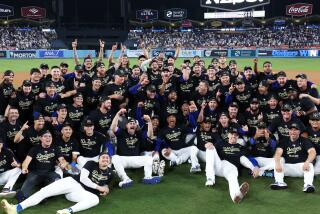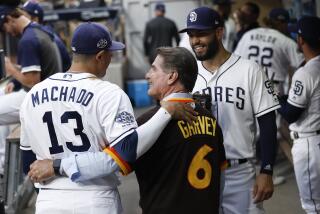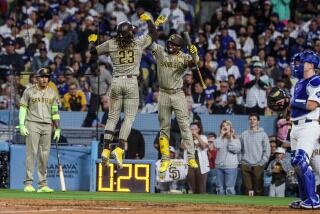Santiago Has Nothing Left to Fret About
YUMA — Benito Santiago is happy. In fact, he almost sounds deliriously happy. It is as if he has broken through his personal cloud bank and into the sunshine.
“Now,” he said, “is my time.”
Santiago, you see, sort of grumbled his way through the 1989 season. He felt unappreciated, under-used and misunderstood . . . and said so. He always seemed to have the look of George Bush with a mouthful of broccoli.
Indeed, it was a year in which Santiago’s ego took a battering, some of it real and some imagined.
--He was bothered by being given periodic days of rest, which he preferred to consider benchings.
--He was bothered by the possibility of being traded to make room for upcoming Sandy Alomar Jr.
--He was bothered, ultimately, by having to go to arbitration to decide a $500,000 difference of opinion in terms of his 1990 contract. He was asking $1.25 million, and the club was offering $750,000.
None of that seemed fair to a man considered by many to be the best catcher in baseball. There he was, all of 24 years old, inexplicably wondering about job security. He felt like he had been rather prematurely admitted to the Over-the-Hill Gang.
What happened in the off-season, of course, was that the Padres traded Alomar and not Santiago. What’s more, Santiago won his arbitration case and the $1.25 million salary.
All of the sudden, Benito Rivera Santiago awakened with an awful lot to feel good about. He is glowing rather than glowering.
“I’m happy,” he said. “Nothing’s going to bother me anymore. Already, I’m ready to play. My body’s ready and my mind’s ready. I feel good. I feel happy.”
He has magically gone from everything bothering him to nothing bothering him. This is an attitudinal transformation akin to Eric Dickerson saying he’s just lucky to have a chance to play football.
Security, to be sure, can work wonders.
Santiago, for example, has purchased a home in Chula Vista, something he was hesitant to do amid all the speculation about whether he would be traded to make room for Alomar Jr.
Now it was time to set roots.
“It’s good to have our own house,” he said. “I love it. I’m looking for the future for myself and my family.”
And looking for good things in the very near future.
“I’m going to give myself to San Diego,” he said, “and I’m going to give myself to Jack McKeon.”
This is another revelation, since McKeon and Santiago were frequently at odds in 1989. Santiago did not like it when he was not in the lineup. If his name was not in the lineup, McKeon was the culprit who did not put it there.
“It’s hard when you want to play every day,” Santiago said, “but now I understand what he was trying to do. He was trying to give me a rest. He was doing me a favor. He’s great. I like Jack McKeon.”
We’re not exactly talking unabashed love here, but this relationship has come a long way from where it was in 1989 . . . and earlier, for that matter.
“He just didn’t understand what I was trying to do,” McKeon said. “He’s a good kid. I understand him. I know he wants to play. But I wanted to get him out of there when he got into a rut so he wouldn’t put too much pressure on himself, and other times, I just wanted to give him a break to keep him strong.”
So, given this atmosphere of understanding, is it fine now with Santiago if he catches maybe 130 games in 1990?
“Well,” he said, smiling, “I love to play. I love to be in there. But he’s the manager. I’m going to go with him and not give him a hard time. I’m not going to be a troublemaker.”
Perhaps increased security has also produced increased maturity. Perhaps this evolution is merely the product of growing into a 25-year-old with a one-year contract but a long-term lease on both a position and a community.
It was obvious that Santiago was also being influenced by his environment. Looking around the Padre locker room, he liked what he saw.
Yes, what he saw was the potential for even more happiness.
“This is going to be an exciting year,” he said. “Maybe like ’84. I didn’t play for that team . . . I think I was in single-A or double-A . . . but I followed those guys and had fun watching them. Playing on a team like that would be great.”
The Padres and their fans have been awaiting an encore to that memorable 1984 season.
“I don’t want to talk about us in the World Series already,” Santiago said, “but I’m happy to see a group like the group of guys we have. It feels like a family.”
Families do occasionally squabble, but you get the sense Santiago does not want to be the one doing the squabbling. Every family seems to have its enfant terrible, but maybe Benito Santiago has grown too mature and too secure to play that role.
Maybe even too happy.


